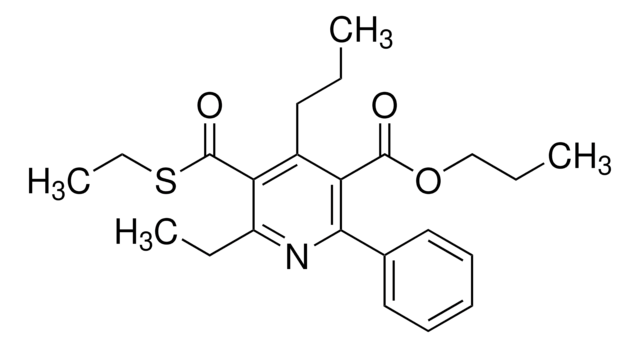SML1983
PSB-603
≥98% (HPLC)
Sinónimos:
8-(4-(4-(4-Chlorophenyl)piperazide-1-sulfonyl)phenyl)-1-propylxanthine, 8-[4-[[4-(4-Chlorophenyl)-1-piperazinyl]sulfonyl]phenyl]-3,9-dihydro-1-propyl-1H-purine-2,6-dione, PSB 603, PSB603
About This Item
Productos recomendados
assay
≥98% (HPLC)
form
powder
color
white to brownish
solubility
DMSO: 2 mg/mL to clear
shipped in
ambient
storage temp.
2-8°C
SMILES string
O=C(N1CCC)NC2=C(N=C(C3=CC=C(S(=O)(N4CCN(C5=CC=C(Cl)C=C5)CC4)=O)C=C3)N2)C1=O
InChI
1S/C24H25ClN6O4S/c1-2-11-31-23(32)20-22(28-24(31)33)27-21(26-20)16-3-9-19(10-4-16)36(34,35)30-14-12-29(13-15-30)18-7-5-17(25)6-8-18/h3-10H,2,11-15H2,1H3,(H,26,27)(H,28,33)
InChI key
OVHCTHHFOHMNFV-UHFFFAOYSA-N
Biochem/physiol Actions
signalword
Warning
hcodes
Hazard Classifications
Skin Irrit. 2
Storage Class
11 - Combustible Solids
wgk_germany
WGK 3
flash_point_f
Not applicable
flash_point_c
Not applicable
Elija entre una de las versiones más recientes:
Certificados de análisis (COA)
Lo sentimos, en este momento no disponemos de COAs para este producto en línea.
Si necesita más asistencia, póngase en contacto con Atención al cliente
¿Ya tiene este producto?
Encuentre la documentación para los productos que ha comprado recientemente en la Biblioteca de documentos.
Los clientes también vieron
Nuestro equipo de científicos tiene experiencia en todas las áreas de investigación: Ciencias de la vida, Ciencia de los materiales, Síntesis química, Cromatografía, Analítica y muchas otras.
Póngase en contacto con el Servicio técnico










